
-
Find the right food for your petTake this quiz to see which food may be the best for your furry friend.Find the right food for your petTake this quiz to see which food may be the best for your furry friend.Featured products
 Perfect Digestion Small & Mini Adult Dog Food
Perfect Digestion Small & Mini Adult Dog FoodHill's Science Plan Perfect Digestion Small & Mini Adult Dog Food with Turkey is a complete premium pet food for small breed adult dogs aged 1–6 years. This deliciously smooth mousse is precisely balanced to deliver the appropriate amount of energy and to support digestive health in adult, small breed dogs.
Shop Now Hypoallergenic Small & Mini Adult Dog Food
Hypoallergenic Small & Mini Adult Dog FoodHILL'S SCIENCE PLAN Hypoallergenic Small&Mini Adult dog food with Salmon is complete pet food for adult small dogs 1–6 years old. It's formulated for dogs with delicate skin and stomach, with limited high quality novel protein sources & no grain.
Shop Now Perfect Weight Small & Mini Adult Dog Food
Perfect Weight Small & Mini Adult Dog FoodHill's Science Plan Adult Small & Mini Dog Food with Turkey is a complete premium pet food for adult small dogs from 1 year old that are prone to weight gain or slightly overweight. This deliciously smooth mousse is formulated to deliver the appropriate amount of energy to support weight maintenance in adult dogs.
Shop NowFeatured products Sterilised Mature Adult Cat Food
Sterilised Mature Adult Cat FoodHill's Science Plan Sterilised Cat Mature Adult Cat Food with Chicken is specially formulated with ActivBiome+ Multi-Benefit Technology. It is a precisely balanced nutrition tailored to meet the needs of mature adult sterilised cats, ages 7+, and to promote graceful ageing.
Shop Now Oral Care Adult Cat Food
Oral Care Adult Cat FoodHill's Science Plan Oral Care Adult Cat Food with Chicken contains clinically proven kibble technology to reduce plaque & tartar build up.
Shop Now Urinary Health Adult Cat Food with Chicken
Urinary Health Adult Cat Food with ChickenHill's Science Plan Urinary Health Adult Cat Food with Chicken supports the health of the whole urinary system. Suitable for sterilised cats.
Shop Now -
Dog
- Dog Tips & Articles
-
Health Category
- Weight
- Food & Environmental Sensitivities
- Urinary
- Digestive
- Joint
- Kidney
-
Life Stage
- Puppy Nutrition
- Adult Nutrition
- Senior Nutrition
Cat- Cat Tips & Articles
-
Health Category
- Weight
- Skin & Food Sensitivities
- Urinary
- Digestive
- Kidney
-
Life Stage
- Kitten Nutrition
- Adult Nutrition
Featured articles Tips For Mixing Wet And Dry Pet Food
Tips For Mixing Wet And Dry Pet FoodDiscover tips for mixing wet and dry pet food to ensure balanced nutrition and variety for your pet. For comprehensive feeding advice, visit Hill's Pet UK.
Read More Virtual Vet Visits: What You Need to Know
Virtual Vet Visits: What You Need to KnowLearn the ins and outs of a televet appointment before you talk to a vet online.
Read More Develop your gut instinct | Hill's Pet
Develop your gut instinct | Hill's PetDigestive disorders can affect any part of the digestive system, from the stomach, small intestine and through to the large intestine.
Read More -


Being sick is no fun, especially when you have to take medicine in order to feel better. It's no different for your furry friends. Whether for an illness or an allergy, cats sometimes need medicine to improve their health.
Use these helpful tips on how to give your cat a pill to make the process less stressful for both of you, and help get them on their way back to feeling better.
Holding Your Cat
For some cats, simply being held can create stress. Approach your cat carefully, speaking to them in a gentle and soothing voice as you scoop them up. Wrap them in a soft towel or blanket, recommends Cats Protection, restraining the legs and leaving just the head free. Supporting their legs so they don't dangle freely can also make them feel more comfortable and secure.
How to Give Your Cat a Pill
Medicine for cats usually comes in pill form. With medication in hand, keep this in mind: cats are smart creatures that don't take kindly to changes in their routine, and they won't make it easy on you. Unlike your dog, who will happily scoff down a pill hidden in a treat you'll have to approach your cat in a calm but calculating way.
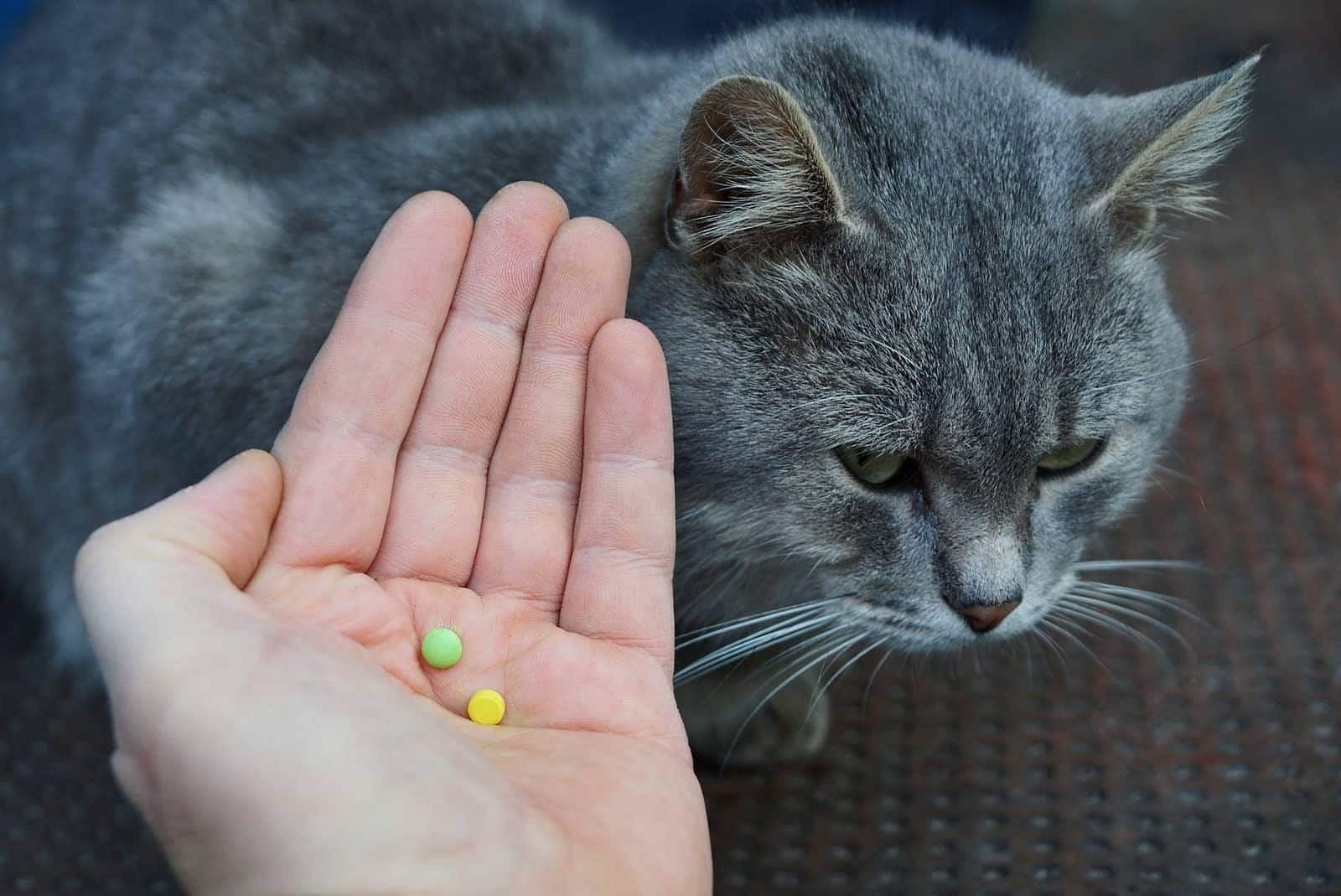
If you have a cooperative cat, try putting the pill directly in their mouth. Don't toss the pill into their mouth as this could create a choking hazard (or they’ll just spit it right back out at you!). Instead, place it on the centre of their tongue near the back of the mouth, then gently rub their throat to encourage the pill to go down, advises International Cat Care. Offer them a fresh bowl of water to wash it down.
The "Meatball"
Another method for giving your cat a pill requires a stealthier move. Start by hiding the pill in your cat’s usual food dish with their usual food. Wet or semi-moist cat food works best, but if your cat only eats dry food, you can give them the moist food when they take the pill, making it an exciting treat.
Another trick is to hide the pill in a small ball of cat food. This game of hide-and-seek can be played by hiding the pill in their wet food, rolled into a ball and presented to your cat as a fun treat or snack.
If your cat refuses the pill in their food, you may wonder if you can tempt them with “people” food like tuna. However, many foods can cause gastrointestinal distress in cats. Always check with your veterinarian before giving non-pet food to your cat.
Cat Food Gravy
If you're looking for another option for how to give your cat a pill, you may be tempted to try crushing it into a powder form. But, as the PDSA points out, some pills don’t work as well if they’re crushed and must be administered whole. Always check with your vet and get their express confirmation that it’s safe to crush the pill first.
If your cat’s medication can be crushed, you can do this by crushing it between two spoons or investing in a pill crusher/cutter from your local pharmacy or pet store. This tool makes crushing a little simpler and cleaner, as the medication is contained to the device, and they only cost a few pounds.
Stir the crushed-up medication in a small portion of cat food gravy, which (hopefully) your cat will lap up. The strong flavour of the gravy will ideally mask the unpleasant taste of the pill. Never give your cat medication in milk, since many cats can't digest dairy. If they refuse a spoonful of gravy, incorporate it into their regular food, either as a special topping for dry food or mixed with wet food.


Tasty Tips
Liquid Formula
If your cat refuses to take medication or is too sick to eat normally, the vet may prescribe the medicine in a liquid formula to be administered via syringe. Most forms of liquid medicine need to be kept refrigerated. However, cats are more likely to accept medicine that is at room temperature. Never microwave medication. You can warm it up by holding the syringe in your hand for a few minutes or submerging it in a cup of warm (not hot) water.
As noted earlier, hold your cat in a safe, comfortable way with the syringe in your dominant hand. Allow your cat to lick the tip of the syringe so they can sample the medicine, then depress slowly on the plunger. Aim the stream of medicine toward the back of their throat, but be careful not to tilt their head back as this could cause them to inhale some of the liquid or choke.
Once the medicine is in your cat’s mouth, hold their mouth closed for a bit to make sure they swallow the liquid. Don't worry if they spit out some of the medicine — it's common. Even if some ends up on your lap, avoid re-medicating and wait until the next dosage is due.
Eye and Ear Drops
Sometimes, a cat needs to take eye or ear drops, particularly if they have allergies. Just as when you administer a pill or liquid formulas, you'll need to hold your cat securely to administer them.
For eye drops, Blue Cross first recommends letting your cat sniff the bottle and get familiar with the scent. Then, you can reward them with a treat so that they associate the scent with a positive feeling. When you’re ready to administer the eye drops, use the finger and thumb of your non-dominant hand to hold your cat’s eyelid open, and then use your dominant hand to administer the medication. It’s often best to come from above, below or from the side of their head, rather than straight at their face, so they don't see it coming. Never touch the cat's eye with the eye dropper or your fingers.
For ear drops, place the required number of drops into your cat’s ear and then gently massage the base of the ear in a circular motion. Your cat won't like either of these methods, but as with all medication for cats, it's vital to their health.
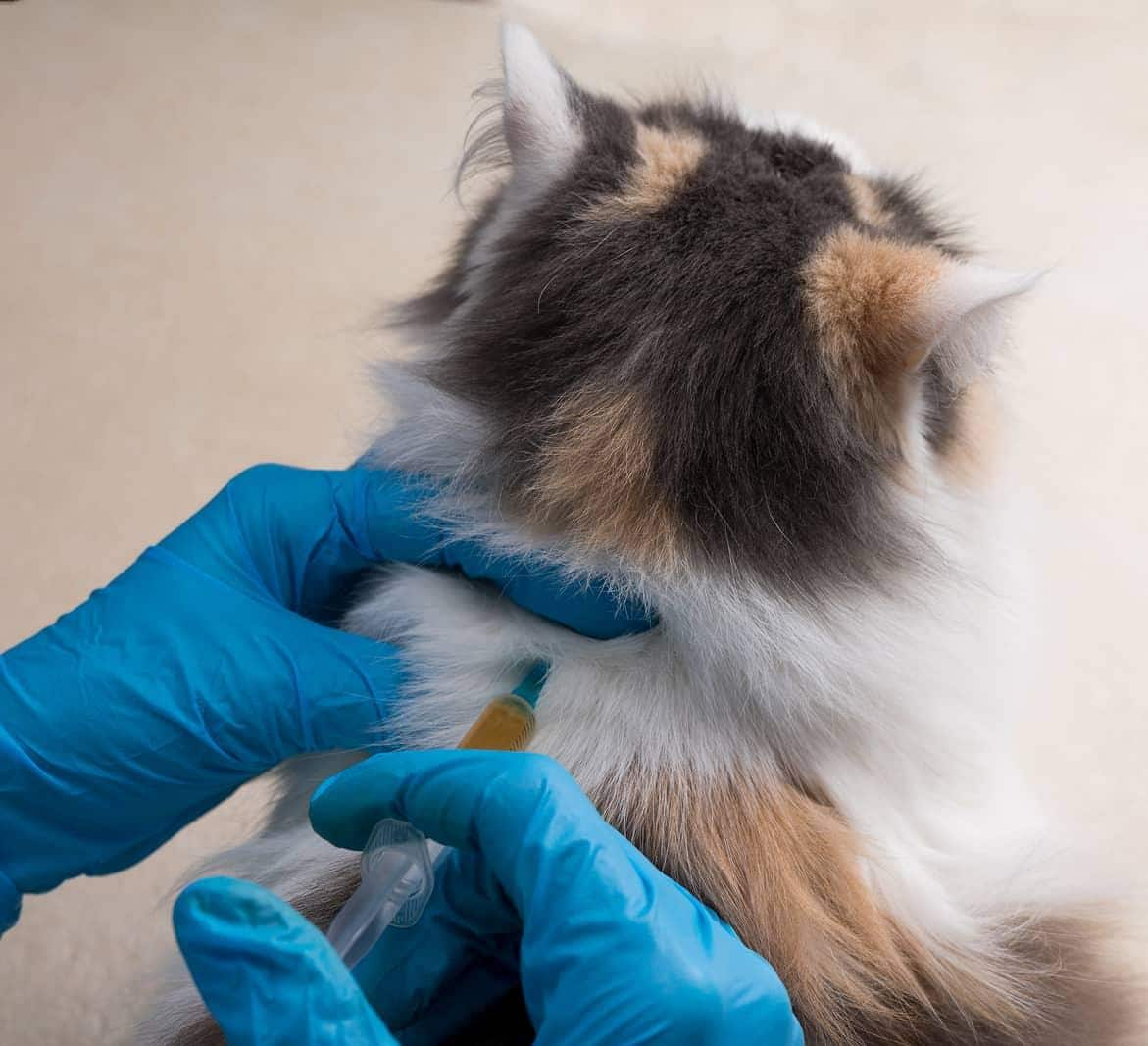 Injections
Injections
Certain illnesses, such as diabetes, require pet parents to inject medication under the skin. You'll benefit from a second set of hands when giving injections, so enlist a helper to keep your cat in place with a towel or a firm but gentle grip.
A cat may require an injection depending on the medication, so ask your vet to show you how and where you should give the injection. Always use a new needle for each dose and record the time and date of every injection. Be sure to speak to your vet if you have any concerns about administering injections, or if you need further advice or guidance.
After administering medication, give your cat some extra snuggles. They may also want some alone time, so give them the time and space they need if they want to hide for a bit. Never throw a needle in the rubbish bin when you're finished; dispose of it in an approved sharps container or bring it to your local pharmacy or veterinarian's office.
If you suspect your cat is sick, first contact your vet to schedule a checkup and only give your pet the specific medicine prescribed by the vet. You should never give your cat over-the-counter (OTC) medicines formulated for people (including eye drops), because many of these medications may be hazardous to pets.
These tips are intended to only be helpful thought-starters. You should always have a conversation with your vet on the best course of action for administering medicine to your cat. Additionally, a thorough examination by a vet is the best course of action to correctly diagnose and treat your cat of any illnesses.
Whether it's a short course of antibiotics or a lifelong means of managing a condition, medicine for cats is sometimes necessary. They may not thank you, but your cat will be happy to be healthy!


Christine O'Brien is a writer, mom, and long-time cat parent whose two Russian Blues rule the house. Her work also appears in Care.com, What to Expect, and Fit Pregnancy, where she writes about pets, pregnancy, and family life. Find and follow her on Instagram and Twitter @brovelliobrien.
Related products

Hill's Science Plan Sterilised Cat Mature Adult Cat Food with Chicken is specially formulated with ActivBiome+ Multi-Benefit Technology. It is a precisely balanced nutrition tailored to meet the needs of mature adult sterilised cats, ages 7+, and to promote graceful ageing.

Hill's Science Plan Urinary Health Adult Cat Food with Chicken supports the health of the whole urinary system. Suitable for sterilised cats.

Hill's Science Plan Oral Care Adult Cat Food with Chicken contains clinically proven kibble technology to reduce plaque & tartar build up.
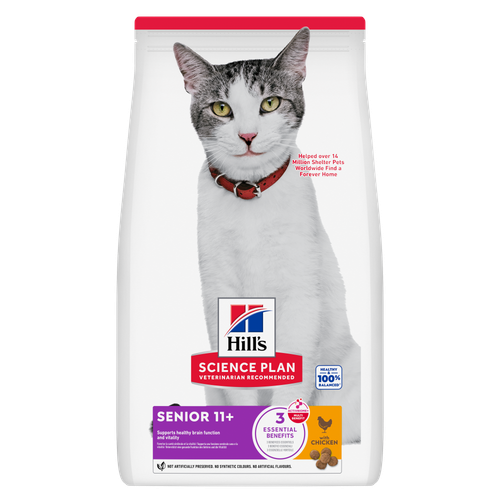
Hill's Science Plan Senior Cat Food with Chicken is a complete pet food, specially formulated with ActivBiome+ Multi-Benefit Technology.
This food supports healthy aging during the golden years. Contains a special ingredient blend to help keep older cats agile, more alert & interactive.
Related articles
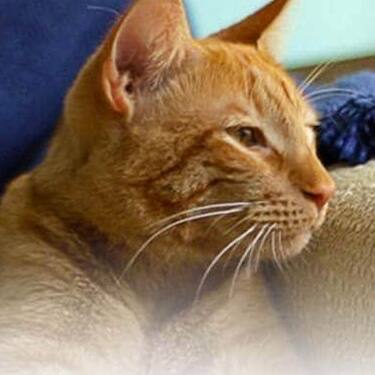
Find the right Hill
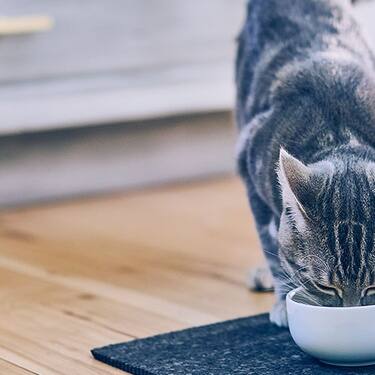
Good nutrition is about the right balance of nutrients. Learn more about health issues when feeding a cat food that has an improper nutritional balance from your friends at Hills Pet Nutrition.
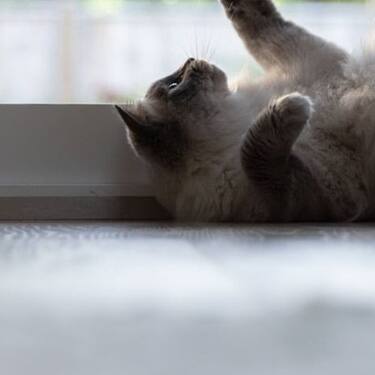
Feeding time can be a wonderful bonding opportunity for you and your cat. Find out how to make the most of it and create a healthy habit with HIll's Pet UK.
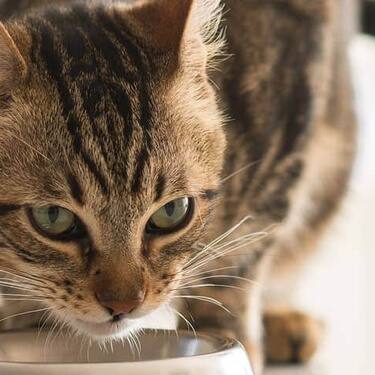
Discover what you can do to spot and support a sensitive cat stomach. See what routines and food you can implement to help your cat be happy and healthy.

Put your cat on a diet without them knowing
Our low calorie formula helps you control your cat's weight. It's packed with high-quality protein for building lean muscles, and made with purposeful ingredients for a flavourful, nutritious meal. Clinically proven antioxidants, Vitamin C+E, help promote a healthy immune system.
Put your cat on a diet without them knowing
Our low calorie formula helps you control your cat's weight. It's packed with high-quality protein for building lean muscles, and made with purposeful ingredients for a flavourful, nutritious meal. Clinically proven antioxidants, Vitamin C+E, help promote a healthy immune system.

